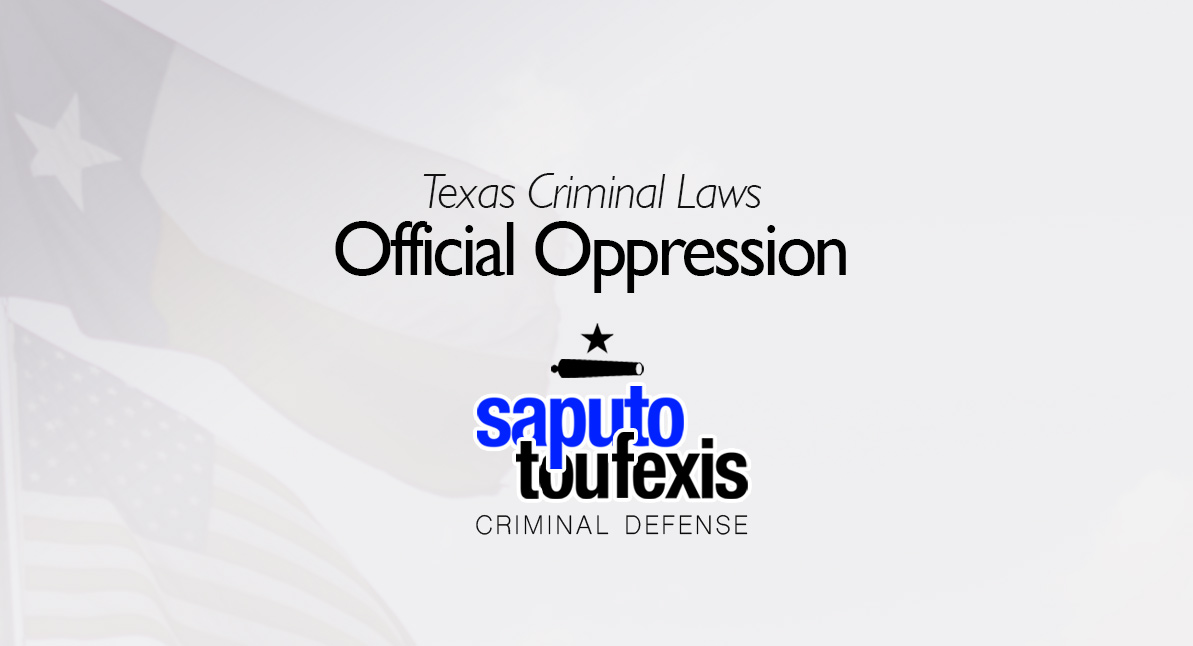The Texas Official Oppression law makes it a crime for a public servant to use their office to unlawfully deny someone their rights, unlawfully mistreat someone or subject them to arrest, detention, search, seizure, dispossession, assessment, or lien, and to sexually harass people.
FAQs about the
Official Oppression law in Texas
- What is the current Texas law about Official Oppression?
- How can I be charged with an Official Oppression offense in Texas?
- What is the statute of limitation for Official Oppression in Texas?
- What is the penalty for a Texas Official Oppression offense?
- Can you get probation for Official Oppression in Texas?
- What level of crime is Official Oppression in Texas?
Some other public corruption laws include Abuse of Official Capacity, Misuse of Official Information, Bribery, and Acceptance of Honorarium.
Have you been charged with Official Oppression? Contact us today to discuss legal representation.
or Text or Call (888) 239-9305
The Texas legislature codified this criminal offense in Texas Penal Code Section 39.03. The legislature did not update this law in 2023. In fact, this law has not been amended since 2019, when the legislature made a nonsubstantive cross-reference update.
The Penal Code classifies the Texas Official Oppression law under Title 8 “Offenses Against Public Administration,” Chapter 39 “Abuse Of Office.” Learn more about the Texas offense of Official Oppression below.
What is the current Texas law about Official Oppression?
Texas law currently defines the offense of Official Oppression in Penal Code Section §39.03 as follows:[1]
(a) A public servant acting under color of his office or employment commits an offense if he:
(1) intentionally subjects another to mistreatment or to arrest, detention, search, seizure, dispossession, assessment, or lien that he knows is unlawful;
(2) intentionally denies or impedes another in the exercise or enjoyment of any right, privilege, power, or immunity, knowing his conduct is unlawful; or
(3) intentionally subjects another to sexual harassment.
Sexual harassment is defined for the purposes of this statute as “unwelcome sexual advances, requests for sexual favors, or other verbal or physical conduct of a sexual nature, submission to which is made a term or condition of a person’s exercise or enjoyment of any right, privilege, power, or immunity, either explicitly or implicitly.”[2]
How can I be charged with an Official Oppression offense in Texas?
You can be charged with Official Oppression in Texas if the state’s attorneys believe that each of the elements of 39.03(a)(1), (a)(2) or (a)(3), as described in the section above, have been met.
What is the statute of limitation for Official Oppression in Texas?
Misdemeanor level Official Oppression charges have a two-year limitations period.[3] Felony level offenses have a three-year limitations period.[4]
What is the penalty for a Texas Official Oppression offense?
A conviction for Official Oppression is punished by default as a Class A misdemeanor,[5] with a maximum possible fine under Texas state law of up to $4,000 and jail time of up to one year.
however, it is a third degree felony “[i]f the public servant acted with the intent to impair the accuracy of data reported to the Texas Education Agency through the Public Education Information Management System (PEIMS) described by Section 42.006, Education Code, under a law requiring that reporting.”[6]
Can you get probation for Official Oppression in Texas?
The Texas Code of Criminal Procedure allows both judges and juries to grant probation for Official Oppression, and judges are also allowed to accept deferred adjudication plea deals.[7]
Note, however, that no matter the offense, neither judges nor juries may recommend community supervision for any suspended sentence of over 10 years.[8] Also, judges may not grant community supervision after a conviction if (1) the defendant used or exhibited a deadly weapon during the commission of the felony or immediate flight thereafter and (2) the defendant used or exhibited the deadly weapon himself or was a party to the offense and knew that a deadly weapon would be used or exhibited.[9]
What level of crime is Official Oppression in Texas?
The Penal Code classifies Official Oppression as either a Class A misdemeanor or third degree felony, depending on the circumstances.
Learn more about the penalty range for this offense in the section above.
Legal References:
^1. Texas Penal Code §39.03. This law is current as of 2024.^2. Texas Penal Code §39.03(c)^3. Code of Criminal Procedure 12.02(a)^4. See Code of Criminal Procedure 12.01(9)^5. Texas Penal Code §39.03(d)^6. Texas Penal Code §39.03(d)^7. See Chapter 42, Texas Code of Criminal Procedure, Art. 42A.054, Art. 42A.056, Art. 42A.102^8. Art. 42A.053(c), Texas Code of Criminal Procedure^9. Art. 42A.054(b), Texas Code of Criminal Procedure










